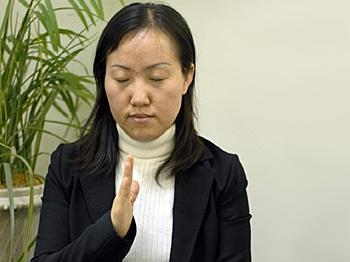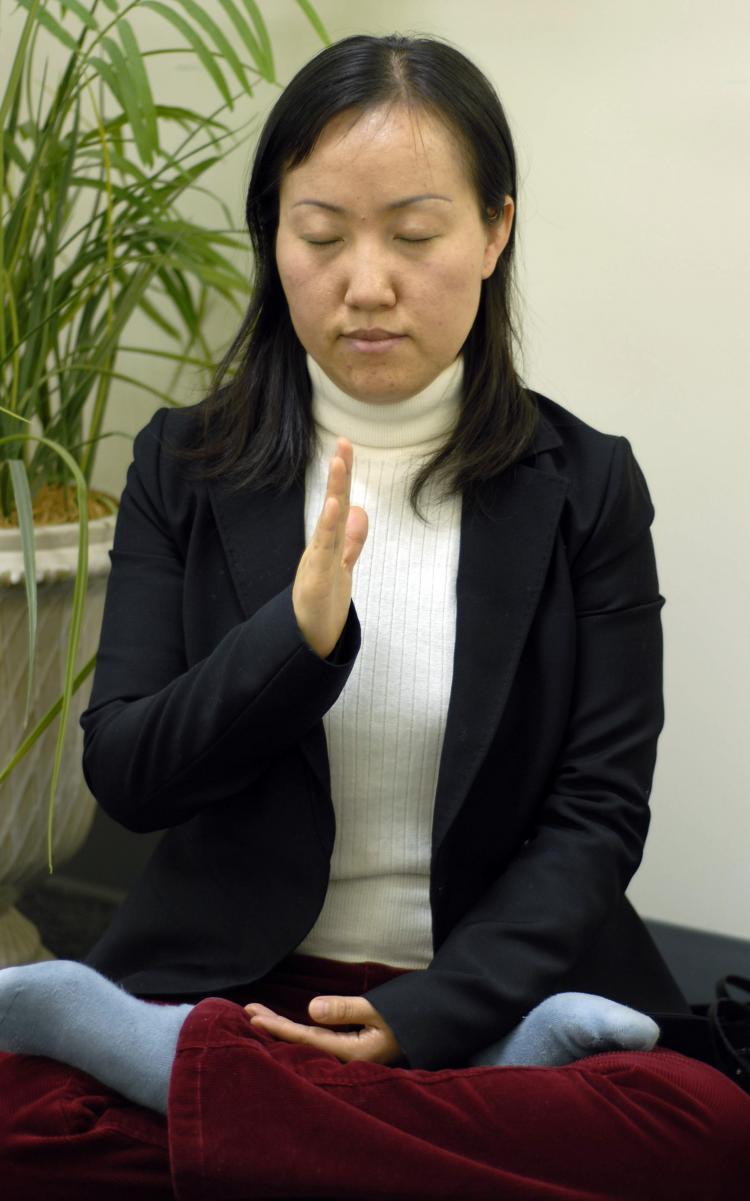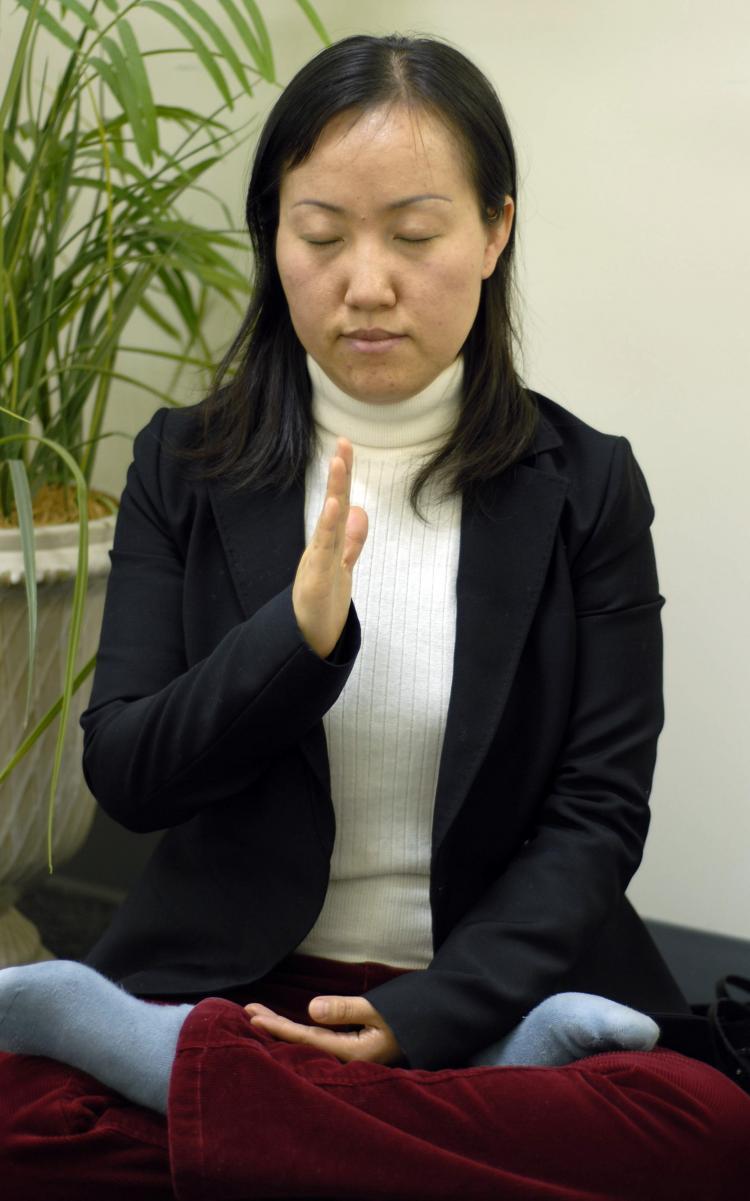The decision was quick. It was made the same day. Jin Zhenyu would face the appeals office of the Communist Party—an apparatus that put fear into Chinese people across the land. Her little yellow book, Zhuan Falun, was her only companion. It was Sunday morning.
Jin was one of about 10,000 Falun Gong practitioners who made the journey to the heart of Beijing on April 25, 1999, to stand in solidarity for Falun Gong. That Sunday, a decade ago, turned from a beacon of hope to a horrific ordeal for many Chinese people, including Jin.
She discovered the practice of Falun Gong six months earlier and was amazed by how the meditation and teachings changed her life.
“It is so good. After practicing I benefited mentally and physically,” Jin said through a translator. “I felt very, very happy. I knew how to be a good person and my family became harmonious.”
Jin heard about the arrest and beating of 45 Falun Gong practitioners in a city called Tianjin on April 23 and 24, 1999. The practitioners had been appealing to a publisher of a magazine that had printed an article defaming Falun Gong and its founder, Li Hongzhi.
“The government officials did not understand Falun Gong,” Jin said, giving her reason for traveling to Zhongnanhai that Sunday. “If they understand the truth they will release the practitioners from jail.”
An atmosphere of calm and peace settled into the area as practitioners spilled out from the appeals area to Tiananmen Square and Zhongnanhai, the compound of the Chinese Communist Party. Some did the Tai Chi-like exercises, some read the main text, “Zhuan Falun,” and some meditated, Jin said. “It was very quiet.”
She said, “No one yelled, there were no banners or signs. We are very peaceful people. We were just waiting.”
They were waiting for officials to listen to their three requests. First, they wanted the beaten practitioners released from jail. Second, they were asking the ban on the book Zhuan Falun to be lifted. And, third, they wanted to help the Chinese regime understand Falun Gong. Later in the day, representatives talked to officials, and came away feeling it was a success, Jin said. By 10 p.m. on April 25, the practitioners had quietly dispersed to their homes.
Expecting freedom to continue practicing their beliefs, the immediate launch of a bitter propaganda campaign shocked Jin and many other practitioners.
But it wasn’t until July 20, 1999, that the full brunt of the persecution hit, driven by the Communist Party and then-head Jiang Zemin.
Jin was arrested on July 22, after going to the appeals office. It was the first in a string of five arrests.
“I remember when I was first arrested. They asked me to strip off and even searched my hair. I protested and kept my clothes on but they forced me and ripped my clothes off.”
She was detained in a forced labor camp for a year. The stories of her different arrests ran together.
“Each time I was arrested they tried to brainwash me into giving up my belief. … They forced us to watch TV, videos, and read newspapers that slandered Falun Gong. We were only allowed to sleep for three hours. If anyone did the Falun Gong exercises they would shock us with electric batons. I got shocked. But I didn’t give up.
“They used electric batons, I got kicked and beaten, my hair was pulled, they used foot shackles and handcuffs. For two weeks in Beijing I could not stand up because my foot shackles and handcuffs were locked together.”
The cell she was kept in with 30 other practitioners was 12 square feet. “We could not all sleep at the same time, so we took turns. We were not allowed to talk to each other or we were tortured.
“We had to make plastic flowers that they exported. The material was poisonous and our fingers got swollen and couldn’t bend. Each day we had to sit on a bench to work and our legs got swollen, too.
“I know some practitioners who were pregnant, but they were still detained. The police still tortured them, they used solitary confinement, some lost their babies.”
Between arrests, Jin was homeless, too scared to go out during the day. Her mother and sister have similar stories to tell, with six arrests between them.
“Most practitioners refused to give up Falun Gong, because Falun Gong is good,” Jin said. “I think in Western society it’s very difficult for people to understand the persecution and the Communist Party—it is very evil and very cunning.”
Jin arrived in the United States in 2006 after escaping to Thailand with her sister and her nephew. Her mother is now in Thailand seeking refugee status.
“After I came to the U.S.A. I saw Western media and I see so much CCP propaganda in it. That’s why we spend so much effort to clarify the truth. The CCP uses so much money and manpower to persecute a good group.”
On April 25, 2009, Jin will be distributing fliers in New York City—to tell people about the appeal in Beijing 10 years ago. “To try to tell them the truth about Falun Gong and not to listen to the CCP propaganda. Help stop the persecution.”
Jin Zhenyu is 36 years old.
Jin was one of about 10,000 Falun Gong practitioners who made the journey to the heart of Beijing on April 25, 1999, to stand in solidarity for Falun Gong. That Sunday, a decade ago, turned from a beacon of hope to a horrific ordeal for many Chinese people, including Jin.
She discovered the practice of Falun Gong six months earlier and was amazed by how the meditation and teachings changed her life.
“It is so good. After practicing I benefited mentally and physically,” Jin said through a translator. “I felt very, very happy. I knew how to be a good person and my family became harmonious.”
Jin heard about the arrest and beating of 45 Falun Gong practitioners in a city called Tianjin on April 23 and 24, 1999. The practitioners had been appealing to a publisher of a magazine that had printed an article defaming Falun Gong and its founder, Li Hongzhi.
“The government officials did not understand Falun Gong,” Jin said, giving her reason for traveling to Zhongnanhai that Sunday. “If they understand the truth they will release the practitioners from jail.”
An atmosphere of calm and peace settled into the area as practitioners spilled out from the appeals area to Tiananmen Square and Zhongnanhai, the compound of the Chinese Communist Party. Some did the Tai Chi-like exercises, some read the main text, “Zhuan Falun,” and some meditated, Jin said. “It was very quiet.”
She said, “No one yelled, there were no banners or signs. We are very peaceful people. We were just waiting.”
They were waiting for officials to listen to their three requests. First, they wanted the beaten practitioners released from jail. Second, they were asking the ban on the book Zhuan Falun to be lifted. And, third, they wanted to help the Chinese regime understand Falun Gong. Later in the day, representatives talked to officials, and came away feeling it was a success, Jin said. By 10 p.m. on April 25, the practitioners had quietly dispersed to their homes.
Expecting freedom to continue practicing their beliefs, the immediate launch of a bitter propaganda campaign shocked Jin and many other practitioners.
But it wasn’t until July 20, 1999, that the full brunt of the persecution hit, driven by the Communist Party and then-head Jiang Zemin.
Jin was arrested on July 22, after going to the appeals office. It was the first in a string of five arrests.
“I remember when I was first arrested. They asked me to strip off and even searched my hair. I protested and kept my clothes on but they forced me and ripped my clothes off.”
She was detained in a forced labor camp for a year. The stories of her different arrests ran together.
“Each time I was arrested they tried to brainwash me into giving up my belief. … They forced us to watch TV, videos, and read newspapers that slandered Falun Gong. We were only allowed to sleep for three hours. If anyone did the Falun Gong exercises they would shock us with electric batons. I got shocked. But I didn’t give up.
“They used electric batons, I got kicked and beaten, my hair was pulled, they used foot shackles and handcuffs. For two weeks in Beijing I could not stand up because my foot shackles and handcuffs were locked together.”
The cell she was kept in with 30 other practitioners was 12 square feet. “We could not all sleep at the same time, so we took turns. We were not allowed to talk to each other or we were tortured.
“We had to make plastic flowers that they exported. The material was poisonous and our fingers got swollen and couldn’t bend. Each day we had to sit on a bench to work and our legs got swollen, too.
“I know some practitioners who were pregnant, but they were still detained. The police still tortured them, they used solitary confinement, some lost their babies.”
Between arrests, Jin was homeless, too scared to go out during the day. Her mother and sister have similar stories to tell, with six arrests between them.
“Most practitioners refused to give up Falun Gong, because Falun Gong is good,” Jin said. “I think in Western society it’s very difficult for people to understand the persecution and the Communist Party—it is very evil and very cunning.”
Jin arrived in the United States in 2006 after escaping to Thailand with her sister and her nephew. Her mother is now in Thailand seeking refugee status.
“After I came to the U.S.A. I saw Western media and I see so much CCP propaganda in it. That’s why we spend so much effort to clarify the truth. The CCP uses so much money and manpower to persecute a good group.”
On April 25, 2009, Jin will be distributing fliers in New York City—to tell people about the appeal in Beijing 10 years ago. “To try to tell them the truth about Falun Gong and not to listen to the CCP propaganda. Help stop the persecution.”
Jin Zhenyu is 36 years old.








Friends Read Free